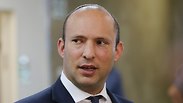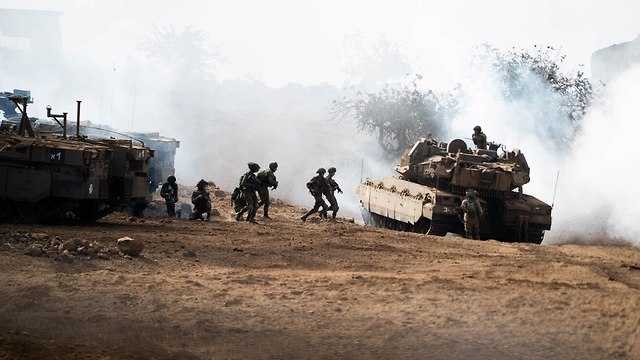
Naftali Bennett
צילום: אלכס קולומויסקי
Bennett implies IDF should 'mow the lawn' in Gaza
In remarks made at annual security conference hosted in IDC Herzliya college, Bayit Yehudi leader warns that failure to deal with Hamas today, as Israel seeks to 'buy time' in pursuit of ceasefire talks, means meeting 'an even bigger enemy' later.
Bayit Yehudi leader Naftali Bennett implied on Tuesday that Israel must “mow the lawn” in Gaza, employing a common metaphor used in reference to stopping attacks on Israel from the Hamas-ruled strip.
“In the media there is an acute dispute about two approaches—cutting all connection with the enemy or continuing contact and long-term security,” Bennett said in a speech delivered at the annual International Institute for Counter-Terrorism Conference in Herzliya.
“In our neighborhood, those who don't mow the lawn, are mowed by the grass,” the education minister said at the opening of his remarks.
“I think that when Rabin chose to go to Oslo he thought that Israel had no strength for continued conflict,” said Bennett in reference to the former prime minister Yitzhak Rabin who signed the Oslo Accords in the 90s with the Palestine Liberation Organization.
“I tie this to Lebanon because Israel was there for many years and its time there was to mow the grass so that the enemy would not bloom,” he explained.
“We disengaged from Lebanon in 2000 and in 2006 and paid a heavy price. We cut off contact again and Hezbollah underwent upgrades and we are, meanwhile, buying time. There is quiet at the moment, but you meet the enemy who is even bigger next time,” Bennett warned.
The minister pointed to the West Bank, arguing that it offered proof of his theory.
“Let’s look at Judea and Samaria. In Oslo we cut off our contact, and then came the Intifada. Until Oslo, we were there as lawn mowers. We succeeded daily in arresting terrorists,” he told his listeners at the IDC Herzliya college.
“Then we launched Operation Defensive Shield (in 2002) and within a year or two we established the same means of lawn mowing and saw growth in terror. Practically speaking, Judea and Samaria is the only front today in which we have continuous contact as a lawn mower and not a single mortar has been fired from there and no tunnels have been dug,” Bennett said.
After illustrating the point, Bennett then addressed the situation in Gaza, which he said had become a “monster” since Israel disengaged from the strip in 2005.
“If we cut contact and say ‘quiet in return for quiet’, it is very tempting because we all want there to be quiet in Sderot, Nir Am, Kfar Aza, but what is the price?" He asked.
“The price is that we will meet the enemy in another two or three years. Imagine Hamas firing on Israel with 30,000 rockets.”
The annual conference took place against a backdrop of reports that Iran had recently given ballistic missiles capable of striking Tel Aviv to Shi'ite proxies in Iraq and is developing the capacity to build more there to deter attacks on its interests in the Middle East.











